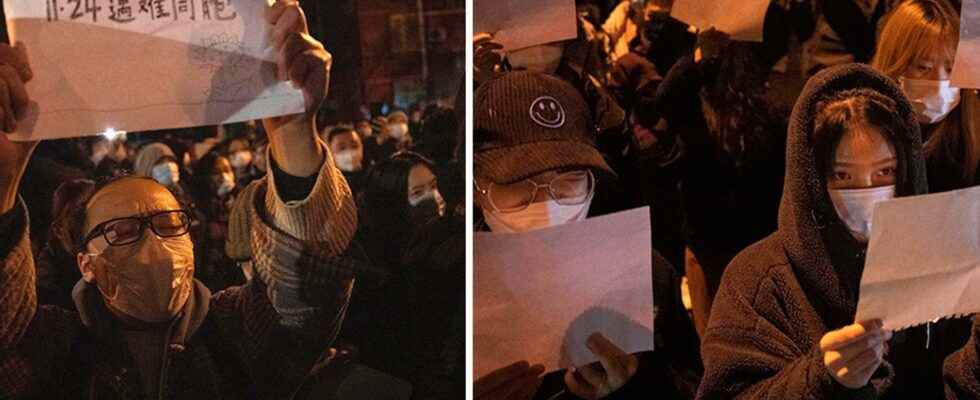Published: Just now
The protesters in China resort to unusual methods to circumvent the censorship in the country.
Blank A4 papers, Friedmann’s equation and reverse slogans are some of the resistance strategies spread along the country’s streets.
At the same time, the regime is struggling to maintain control of the country – by spreading Twitter sex and cutting off spectators at the World Cup.
The protests of recent days in major cities across China against the country’s harsh covid restrictions and sometimes also against leader Xi Jinping are not mentioned at all in Chinese state media.
The protests are often called an “A4 revolution”, according to the British BBCas many protesters silently hold up blank A4 papers.
– There was absolutely nothing on paper, but we know what it means, said a woman who demonstrated in Shanghai to the BBC on Saturday.
Students at Tsinghua University in Beijing instead held up A4 papers with Friedmann’s equation, which deals with the theory of relativity and an expanding universe.
But the important thing was not the equation, but the name Friedmann. In China it is pronounced as “free man”, i.e. “a free man”. Pictures of the students were spread via social media.
Reverse sloganeering was another strategy on the part of the protesters. When police in Beijing demanded they stop shouting “no more lockdowns”, they obeyed orders.
The slogans “we want more lockdowns” and “I want to do covid tests” instead began to echo from the protesters – an obvious ironic mockery of the constables’ demands.
The Chinese authorities are devoting great resources to keeping the internet clean of the protests. When videos are posted on Chinese social media, they often disappear just as quickly, and the search terms “Liangma River” and “Ürümqi Road” yield no protest hits, despite that being where the protesters gathered.
But even the World Cup is being censored, as people are outraged when they see that spectators are no longer required to wear masks, while the restrictions are still in place in China and are the very cause of the protests.
The Chinese state television company CCTV is now censoring all close-ups of spectators from the World Cup. Only distant images of the spectators are shown in the match broadcasts, which are delayed by half a minute.
To reduce the number of protest videos on Chinese social media, Chinese police are also stopping people taking pictures and filming demonstrations. Then they delete the files.
In addition, the Chinese regime uses Twitter to hide what is happening. On Sunday, a large number of Chinese-language Twitter accounts posted links to escort service firms and other sex-related information, along with Chinese city names, the Washington Post newspaper states.
The result was that Twitter users searching for information about the protests in various Chinese cities were instead presented with a lot of unwanted information. The goal was that fewer people read the news about what is happening, according to the newspaper.
Facts
Facts about the protests in China
A deadly fire in a high-rise building in Ürümqi – a city in western China that has been living under covid restrictions since August – sparked the latest protests.
The regime denies a connection, but information spread on social media that people in the high-rise were locked up due to the restrictions, and died as a result.
Anger against the continued severe covid restrictions has been widespread in China since before, among other things because they cause recurring deaths.
•Earlier in November, an infant died in Zhengzhou because the covid restrictions delayed the ambulance, according to the parents.
•In September, residents of Chengdu were prevented from fleeing their homes due to a strong earthquake. Then 65 people died.
•In the same month, a bus crashed and 27 passengers died when they were on their way to Guizhou where they were to be placed in corona quarantine.
Source: BBC.
Read more
